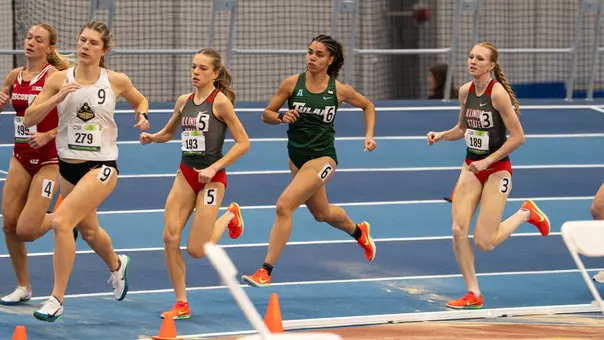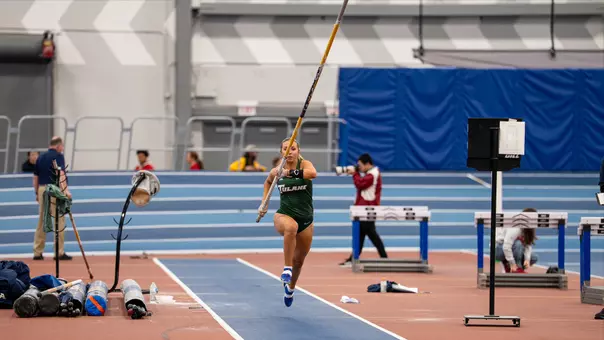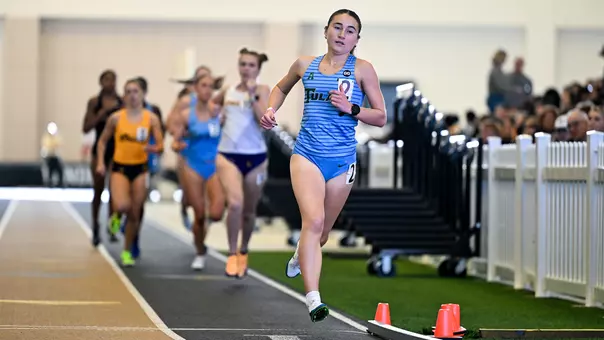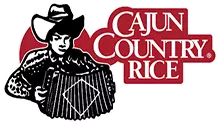.JPG&height=300&type=webp)
Out of the Blocks: Former Sprinter Blocker Soaring in Pro Career
Jul 30, 2018 | Track & Field
NEW ORLEANS – Sani Roseby stood up and screamed at her television.
More than 4,000 miles away, former Tulane sprinter Jasmine Blocker was running for a gold medal.
A coach-athlete bond that began three years ago has only grown since Blocker entered the professional world and kept Roseby as her coach. But from her New Orleans home in mid-July, Roseby could only watch as Blocker reached the pinnacle of her career – so far – in London.
"It always makes me feel good to coach athletes to be better than I was," said Roseby, Tulane's assistant track and field coach and a former three-time All-American at UCLA. "When I play a role in them progressing toward their full potential as an athlete or as a person, it just makes the moment very special for me."
Blocker was competing at the inaugural Athletics World Cup and wearing "USA" across her chest for the first time in her career. Minutes before her race in the 4x400 relay, she remembers walking into the stadium as the American relay team was being introduced. Fireworks went off. She saw herself on the video board. Heard the American delegation in the crowd cheering her on.
Then she went out, ran a career-best 50.7 seconds on her leg and helped the USA to a gold medal. The Americans went on to win the World Cup as a team.
"It's like everything that you dream about: wearing that uniform and crossing the finish line and holding up that American flag with your relay team," Blocker said.
Not bad for a runner who almost went right into the business world after getting her bachelor's degree.
In 2015, three years before winning her gold medal in London, Jasmine Blocker was an undergraduate at Princeton and finishing her degree in psychology. Racing for their track team, she was the school record holder in the 400 with a top time of 53.60 seconds. A solid time, but nothing that might suggest she had a Team USA appearance in her future.
After graduation, Blocker had a full-time consulting job in New York City lined up with a technology company called InfoSys. She was considering going into the real world.
But she also had something else: one remaining year of NCAA eligibility. And her senior year at Princeton was her best athletic year yet.
An assistant coach at Princeton knew Tulane Director of Cross Country and Track & Field Eric Peterson and suggested Blocker come to New Orleans to earn her MBA. With a chance to keep her track career alive, Blocker turned down the job offer and came to Tulane.
That choice wound up being a great one.
"She was very good while she was at Princeton, but we didn't expect the kind of growth and development that she experienced in the one year that we had her here," Peterson said.
When she arrived on campus, Blocker was the team's second-best 400-meter runner behind Lilla McMillan. Blocker didn't think she had any chance of outrunning McMillan. After all, McMillan's best 400 time was two seconds faster than Blocker had ever run.
But once she started training under Roseby, seconds started melting off Blocker's personal best. Having McMillan to push her and Roseby as a coach helped Blocker immensely. The practices between the two athletes were so intense that Roseby often told them they had to practice separately on days when lighter exercises were required.
Roseby immediately saw the potential that Blocker didn't see in herself. She predicted the pair would take the top two places at the conference championships.
"I remember always saying, 'We're going 1-2 in conference,'" Roseby said. "'I don't care who gets one and who gets two, but we're doing it.'"
At the indoor championship, McMillan won the title – setting a meet record – and Blocker placed second. Both posted times fast enough to qualify for the NCAA Indoor Championships, and they finished the 2015-16 indoor season as Second Team All-Americans. Outdoors, Roseby's prediction came true again. Once more, McMillan won the championship with Blocker taking second.
But two weeks later at the NCAA East Regional, Blocker finally got the better of her teammate. She came in eighth in the region, booking her spot to the NCAA Outdoor Championships. And at that meet in Oregon, Blocker came in seventh in the entire country, earning First Team All-America honors to close out her college career and set herself up to make waves in the professional ranks.
Her best 400 time at Tulane? That would be 51.66 seconds, nearly two full seconds better than she had ever run at Princeton. And all that added up to her earning a spot at the 2016 U.S. Olympic Trials.
"I don't think I realized how important it was to have someone to push you like [McMillan and Roseby pushed me] until I got here," Blocker said. "There are no off days in practice because you always have someone there who is going to hold you to that high standard."
GOING PRO
After finishing her athletic eligibility, Blocker had one year of classes remaining before she earned her MBA. So she stayed in New Orleans and kept training with Roseby.
But without the structure of college racing, minus a training partner and with the weight of graduate-level classes still on her, Blocker's times suffered. Also crucially, Blocker lacked a professional sponsor to help offset travel and training costs. She entered fewer, mostly local meets, and didn't get the same level of competition she could as a student-athlete.
"She didn't realize how difficult the transition would be from college to the pros," Roseby said. "Soon she found out it takes much more effort on and off the track."
But while her athletics may have slipped that year, her business prospects were looking up. In summer 2016, Blocker completed an eight-week internship at a major Wall Street investment bank. The company liked her work during the internship and offered her a full-time job once she completed her MBA in 2017.
Still with Olympic dreams ahead of her, Blocker was able to get the firm to defer her employment until after the 2020 Tokyo Games. Two years from now, when the Olympics are over, she'll have a job waiting for her on Wall Street.
Once she got her real-world future secured, Blocker completed her MBA in May 2017 and rededicated herself to track.
Blocker began to reach out to companies asking for sponsorships. An apparel company called Oiselle enjoyed her Instagram account and agreed to add her to its team of sponsored athletes. Later, logistics company Gemini Shippers Group also signed on to sponsor her.
With funding flowing and more free time, she was able to attend better meets and intensify her training. While she was working on her own career, she also found time to serve as a volunteer assistant coach for the Green Wave and give back to the program.
"Aside from the athletic success that she's had, she's just a young woman who showcases the absolute best in representing a program with honor and distinction and maturity," Peterson said.
At the USA Track & Field Outdoor Championships in June, it all came together. Blocker ran the 400 and made it all the way to the national championship final. In that race, she placed seventh in the country and set a new personal best of 51.46 seconds in the semifinals. That performance combined with strong relays she had been running during the year caught the eyes of Team USA.
When it came time for the inaugural World Cup, Blocker got the call. She was going to London.
BIG PLANS AHEAD
Blocker hopes that her performance at the World Cup has made her a reliable option for Team USA in its 4x400 squads. So far, so good.
In August, Team USA will be calling on her again for the NACAC Senior Championships in Toronto. That event, featuring countries in North America, Central America and the Caribbean, will be Blocker's second time wearing USA on her uniform.
"I'm hoping to have an even faster split at NACAC and show them that Team USA can count on me whenever," Blocker said.
A strong performance at NACAC could be the key to keeping Blocker in the rotation of Team USA's sprinters for a long time to come. And in two years, with continued dedication to the sport and a devoted coach in Roseby, Blocker may soon be hearing her name announced at the 2020 Tokyo Olympics.
If that happens, she'll surely have a cheering section in Japan: Roseby yelling coaching tips from the stands.
"She still hasn't reached her full potential," Roseby said. "She's just now scratching the surface. The sky is the limit for her. She really does have the talent, and she really can accomplish great things."
More than 4,000 miles away, former Tulane sprinter Jasmine Blocker was running for a gold medal.
A coach-athlete bond that began three years ago has only grown since Blocker entered the professional world and kept Roseby as her coach. But from her New Orleans home in mid-July, Roseby could only watch as Blocker reached the pinnacle of her career – so far – in London.
"It always makes me feel good to coach athletes to be better than I was," said Roseby, Tulane's assistant track and field coach and a former three-time All-American at UCLA. "When I play a role in them progressing toward their full potential as an athlete or as a person, it just makes the moment very special for me."
Blocker was competing at the inaugural Athletics World Cup and wearing "USA" across her chest for the first time in her career. Minutes before her race in the 4x400 relay, she remembers walking into the stadium as the American relay team was being introduced. Fireworks went off. She saw herself on the video board. Heard the American delegation in the crowd cheering her on.
Then she went out, ran a career-best 50.7 seconds on her leg and helped the USA to a gold medal. The Americans went on to win the World Cup as a team.
"It's like everything that you dream about: wearing that uniform and crossing the finish line and holding up that American flag with your relay team," Blocker said.
Not bad for a runner who almost went right into the business world after getting her bachelor's degree.
FROM TIGERS TO TULANE🏆 SCINTILLATING FINAL SESSION SEES USA CLAIM ATHLETICS WORLD CUP TITLE IN LONDON
— Athletics World Cup (@AthWorldCup) July 15, 2018
📰 https://t.co/46GeGF674O pic.twitter.com/zAuPbvHoNj
In 2015, three years before winning her gold medal in London, Jasmine Blocker was an undergraduate at Princeton and finishing her degree in psychology. Racing for their track team, she was the school record holder in the 400 with a top time of 53.60 seconds. A solid time, but nothing that might suggest she had a Team USA appearance in her future.
After graduation, Blocker had a full-time consulting job in New York City lined up with a technology company called InfoSys. She was considering going into the real world.
But she also had something else: one remaining year of NCAA eligibility. And her senior year at Princeton was her best athletic year yet.
An assistant coach at Princeton knew Tulane Director of Cross Country and Track & Field Eric Peterson and suggested Blocker come to New Orleans to earn her MBA. With a chance to keep her track career alive, Blocker turned down the job offer and came to Tulane.
That choice wound up being a great one.
"She was very good while she was at Princeton, but we didn't expect the kind of growth and development that she experienced in the one year that we had her here," Peterson said.
When she arrived on campus, Blocker was the team's second-best 400-meter runner behind Lilla McMillan. Blocker didn't think she had any chance of outrunning McMillan. After all, McMillan's best 400 time was two seconds faster than Blocker had ever run.
But once she started training under Roseby, seconds started melting off Blocker's personal best. Having McMillan to push her and Roseby as a coach helped Blocker immensely. The practices between the two athletes were so intense that Roseby often told them they had to practice separately on days when lighter exercises were required.
Roseby immediately saw the potential that Blocker didn't see in herself. She predicted the pair would take the top two places at the conference championships.
"I remember always saying, 'We're going 1-2 in conference,'" Roseby said. "'I don't care who gets one and who gets two, but we're doing it.'"
At the indoor championship, McMillan won the title – setting a meet record – and Blocker placed second. Both posted times fast enough to qualify for the NCAA Indoor Championships, and they finished the 2015-16 indoor season as Second Team All-Americans. Outdoors, Roseby's prediction came true again. Once more, McMillan won the championship with Blocker taking second.
But two weeks later at the NCAA East Regional, Blocker finally got the better of her teammate. She came in eighth in the region, booking her spot to the NCAA Outdoor Championships. And at that meet in Oregon, Blocker came in seventh in the entire country, earning First Team All-America honors to close out her college career and set herself up to make waves in the professional ranks.
Her best 400 time at Tulane? That would be 51.66 seconds, nearly two full seconds better than she had ever run at Princeton. And all that added up to her earning a spot at the 2016 U.S. Olympic Trials.
"I don't think I realized how important it was to have someone to push you like [McMillan and Roseby pushed me] until I got here," Blocker said. "There are no off days in practice because you always have someone there who is going to hold you to that high standard."
GOING PRO
After finishing her athletic eligibility, Blocker had one year of classes remaining before she earned her MBA. So she stayed in New Orleans and kept training with Roseby.
But without the structure of college racing, minus a training partner and with the weight of graduate-level classes still on her, Blocker's times suffered. Also crucially, Blocker lacked a professional sponsor to help offset travel and training costs. She entered fewer, mostly local meets, and didn't get the same level of competition she could as a student-athlete.
"She didn't realize how difficult the transition would be from college to the pros," Roseby said. "Soon she found out it takes much more effort on and off the track."
But while her athletics may have slipped that year, her business prospects were looking up. In summer 2016, Blocker completed an eight-week internship at a major Wall Street investment bank. The company liked her work during the internship and offered her a full-time job once she completed her MBA in 2017.
Still with Olympic dreams ahead of her, Blocker was able to get the firm to defer her employment until after the 2020 Tokyo Games. Two years from now, when the Olympics are over, she'll have a job waiting for her on Wall Street.
Once she got her real-world future secured, Blocker completed her MBA in May 2017 and rededicated herself to track.
Blocker began to reach out to companies asking for sponsorships. An apparel company called Oiselle enjoyed her Instagram account and agreed to add her to its team of sponsored athletes. Later, logistics company Gemini Shippers Group also signed on to sponsor her.
With funding flowing and more free time, she was able to attend better meets and intensify her training. While she was working on her own career, she also found time to serve as a volunteer assistant coach for the Green Wave and give back to the program.
"Aside from the athletic success that she's had, she's just a young woman who showcases the absolute best in representing a program with honor and distinction and maturity," Peterson said.
At the USA Track & Field Outdoor Championships in June, it all came together. Blocker ran the 400 and made it all the way to the national championship final. In that race, she placed seventh in the country and set a new personal best of 51.46 seconds in the semifinals. That performance combined with strong relays she had been running during the year caught the eyes of Team USA.
When it came time for the inaugural World Cup, Blocker got the call. She was going to London.
BIG PLANS AHEAD
Blocker hopes that her performance at the World Cup has made her a reliable option for Team USA in its 4x400 squads. So far, so good.
In August, Team USA will be calling on her again for the NACAC Senior Championships in Toronto. That event, featuring countries in North America, Central America and the Caribbean, will be Blocker's second time wearing USA on her uniform.
"I'm hoping to have an even faster split at NACAC and show them that Team USA can count on me whenever," Blocker said.
A strong performance at NACAC could be the key to keeping Blocker in the rotation of Team USA's sprinters for a long time to come. And in two years, with continued dedication to the sport and a devoted coach in Roseby, Blocker may soon be hearing her name announced at the 2020 Tokyo Olympics.
If that happens, she'll surely have a cheering section in Japan: Roseby yelling coaching tips from the stands.
"She still hasn't reached her full potential," Roseby said. "She's just now scratching the surface. The sky is the limit for her. She really does have the talent, and she really can accomplish great things."
Travel Day POV with Tulane Track & Field 🎥
Monday, February 19
Tulane XC & TF: Who drew the best Angry Wave? 🧐
Tuesday, August 29
Track & Field Vlog
Thursday, January 19
Tulane Track & Field: Migle Murskaite Preview
Friday, January 28















